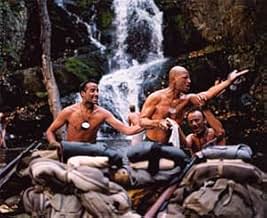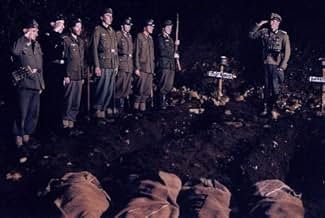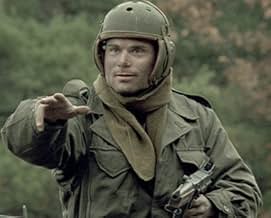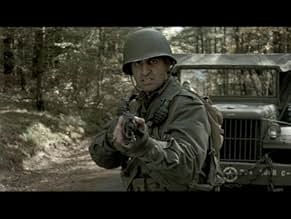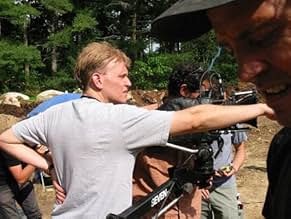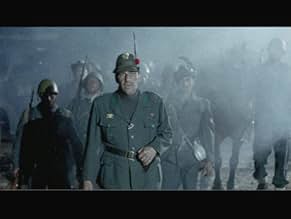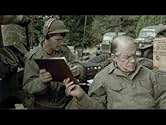IMDb RATING
5.0/10
955
YOUR RATING
The story of ordinary men during WWII as seen from three different points of View.The story of ordinary men during WWII as seen from three different points of View.The story of ordinary men during WWII as seen from three different points of View.
- Awards
- 4 wins total
Matthew Black
- Sgt. Hoakes
- (as Mathew Black)
Achim Buchner
- Franz
- (as Achim Beuchner)
- Director
- Writers
- All cast & crew
- Production, box office & more at IMDbPro
Featured reviews
I've a lot of respect for what American director Ari Taub is at least trying in his 2004 film set during World War II, entitled The Fallen. Where directors such as Michael Bay have, in the past, been granted huge sums of money only to go on and totally miss the mark in capturing that of what warfare is; does and represents in the form of Pearl Harbor, is terrifying. Likewise, other recent films have disappointedly used the sub-genre of war as a backdrop of spectacle to unfold cheap, familiar and dreary self discovery tales, as seen in James Cameron's Avatar, that aren't particularly interesting nor smart. Given this, it is difficult not to muster up at least an ounce of knowing for those such as Taub and The Fallen, whom are trying to explore ideas and get a proper film, about something, followed through with. It's unfortunate then, that the The Fallen ends up as uninteresting and detached as it does; a plodding and dreary feature that mostly drags for all of it's little-over-an-hour-and-a-half runtime as it strives to explore the viewpoints of a handful of soldiers amongst various factions in Second World War Italy.
The key in what the film wants to do ironically lies in its own inability to properly distinguish character from character or troop from troop. The two writers, Nick Day and Caio Ribeiro, and as a consequence the film itself, are more preoccupied with the notion of entire squads of soldiers or collections of people representative of respective ideologies battling it out on the front-line of a war. The film, particularly through it's tag-line which reads: "There are three sides to every story: ours, theirs, and the truth." is about the universal struggle with life, death and everything else all troops on the battle field share as they fight and strive for each of their respective victories more than it is an exploration of the damaging physical or psychological effects more famous examples of war films from recent decades have portrayed.
The foundations of this idea are fair enough, the result is a mostly wavy and unfocused piece which makes its point fairly quickly and covers most of its bases aptly enough when doing so, but too sporadically to really immerse us. The approach additionally denies the audience a chance to map onto an individual character around which the events play out, instead opting to cover German; Italian and American troops within the rural woodlands of Italy as the proverbial net closes in on those on the wrong side towards the end of The War. We're provided with some brief introductions of each of the three parties, the Germans occupying very grey, dishevelled and desperate quarters; the toll of the war etched all over the faces and coming out in the tone of their voices. Later, a lone American trooper jogs through a local village to a large manor house guarded by plain clothed, gun wielding Italians whom stop him and question him. The American keeps his cool at gun point and gets done whatever job he was there for; his isolation from the rest of his troops and individualism in the scene displaying an ability to stay calm and get even the toughest of missions done under threat. Then comes the time to provide us with an Italian perspective, a less than glamorous depiction of Italians as exhibitionists making a racket in a natural spring with the film generally subscribing to displaying them as caricatures throughout, especially disappointing given what has been established as a film all about breaking down boundaries and creating an equal playing field to all involved.
Out on the front-line amidst the gun fire and shrapnel is Charlie Company, of the United states Army, whom are running low on supplies. A platoon of American soldiers, including the aforementioned calm head and a more psychotic soldier whom appears to be channeling Andy Serkis' Private Quinn of 2002's Deathwatch, have been rejected leave and are instead charged with delivering supplies to the front-line that'll make the crucial difference and win them the fight: all half a dozen or so small wooden boxes of it. After the truck they're meant to deliver it all in breaks down, their plight manifests into a trawling across the country side, aid in-tow. This provides their plight with a very sub-Private Ryan feel about proceedings, the film granting us a series of sequences that see the troops caught up in exchanges and various altercations or scenarios with what could or could not be the enemy. Some of which include the running into a suspicious farmyard building and the uncovering of a machine gun emplacement plus trench, each supposedly acting as the catalysts for the troops to garner first hand experience of the front. In short, it's a little patchy and mostly an uninteresting adventure; the film not really being about plot, but more-so the universal thematics; with whatever story in there not being explored nor necessarily told particularly well enough to arouse interest.
One moment does get the blood pumping, one fleeting moment does show that there is indeed power to be had somewhere in the material and it sees Italian soldiers and renegade, anti-establishment Italian soldiers come face to face in a clearing as a standoff occurs; an instance that is well directed and is accompanied by a real sense of both threat and peril. But these moments, while interesting in their brief examining of how fighting on the front morally affects those involved, are too few and far in-between; a moment in which Taub's direction sears through only to have us frustratingly realise not much else is off this level when it seemingly could have been. The film is sporadic, even discombobulated; and with little-to-no discernible narrative to elevate the material above a series of interactions and scenarios of various factions strung together, decidedly disappointing.
The key in what the film wants to do ironically lies in its own inability to properly distinguish character from character or troop from troop. The two writers, Nick Day and Caio Ribeiro, and as a consequence the film itself, are more preoccupied with the notion of entire squads of soldiers or collections of people representative of respective ideologies battling it out on the front-line of a war. The film, particularly through it's tag-line which reads: "There are three sides to every story: ours, theirs, and the truth." is about the universal struggle with life, death and everything else all troops on the battle field share as they fight and strive for each of their respective victories more than it is an exploration of the damaging physical or psychological effects more famous examples of war films from recent decades have portrayed.
The foundations of this idea are fair enough, the result is a mostly wavy and unfocused piece which makes its point fairly quickly and covers most of its bases aptly enough when doing so, but too sporadically to really immerse us. The approach additionally denies the audience a chance to map onto an individual character around which the events play out, instead opting to cover German; Italian and American troops within the rural woodlands of Italy as the proverbial net closes in on those on the wrong side towards the end of The War. We're provided with some brief introductions of each of the three parties, the Germans occupying very grey, dishevelled and desperate quarters; the toll of the war etched all over the faces and coming out in the tone of their voices. Later, a lone American trooper jogs through a local village to a large manor house guarded by plain clothed, gun wielding Italians whom stop him and question him. The American keeps his cool at gun point and gets done whatever job he was there for; his isolation from the rest of his troops and individualism in the scene displaying an ability to stay calm and get even the toughest of missions done under threat. Then comes the time to provide us with an Italian perspective, a less than glamorous depiction of Italians as exhibitionists making a racket in a natural spring with the film generally subscribing to displaying them as caricatures throughout, especially disappointing given what has been established as a film all about breaking down boundaries and creating an equal playing field to all involved.
Out on the front-line amidst the gun fire and shrapnel is Charlie Company, of the United states Army, whom are running low on supplies. A platoon of American soldiers, including the aforementioned calm head and a more psychotic soldier whom appears to be channeling Andy Serkis' Private Quinn of 2002's Deathwatch, have been rejected leave and are instead charged with delivering supplies to the front-line that'll make the crucial difference and win them the fight: all half a dozen or so small wooden boxes of it. After the truck they're meant to deliver it all in breaks down, their plight manifests into a trawling across the country side, aid in-tow. This provides their plight with a very sub-Private Ryan feel about proceedings, the film granting us a series of sequences that see the troops caught up in exchanges and various altercations or scenarios with what could or could not be the enemy. Some of which include the running into a suspicious farmyard building and the uncovering of a machine gun emplacement plus trench, each supposedly acting as the catalysts for the troops to garner first hand experience of the front. In short, it's a little patchy and mostly an uninteresting adventure; the film not really being about plot, but more-so the universal thematics; with whatever story in there not being explored nor necessarily told particularly well enough to arouse interest.
One moment does get the blood pumping, one fleeting moment does show that there is indeed power to be had somewhere in the material and it sees Italian soldiers and renegade, anti-establishment Italian soldiers come face to face in a clearing as a standoff occurs; an instance that is well directed and is accompanied by a real sense of both threat and peril. But these moments, while interesting in their brief examining of how fighting on the front morally affects those involved, are too few and far in-between; a moment in which Taub's direction sears through only to have us frustratingly realise not much else is off this level when it seemingly could have been. The film is sporadic, even discombobulated; and with little-to-no discernible narrative to elevate the material above a series of interactions and scenarios of various factions strung together, decidedly disappointing.
I really enjoyed this film. It was sad and funny and tragic and many other things as well. It reminded me of the hallelujah trail (Burt Lancaster)with loads of people wandering around looking for each other. Eventually they find each other whether they want to or not and a number of them end up dead (this being unlike the Hallelulah Trail). I liked the way that lots of the characters wanted out but kept on going despite their fears.I imagine this is true of most combatants. Some people are heroes (see Audie Murphies Films)but most people are just people. There were a number of stereotypes but then this is also true of life. Wherever you go you meet people who fit these stereotypes. It was a very human film.
This is a very entertaining, and affecting, movie that takes the points of view of ground troops on three sides of World War II (American, German, and Italian) -- each coming into contact with the others -- but the movie focuses on their own personal lives which, when compared one to the other are surprisingly similar. The director, Ari Taub, tells this story with a humorous and quirky touch, showing us the human qualities of our enemies and suggesting that if we ever did humanize our enemies wars would be a lot harder to fight.
There are several story lines to follow here, and the film weaves in and out of each effortlessly -- no small feat. With a cast of -- I'm guessing here -- 50 or so speaking roles (each very well played), I was impressed at the skill of storytelling and the scope attempted on a minimal, truly independent, film budget. There is a "light touch" to the comedy in this movie, and while you might find yourself caught up in the exploits and quirky adventures of the different sets of "heroes", there is more at work here than that: without being preachy, Taub is showing us the futility, the madness, and the human comedy that is war.
I enjoyed this movie a lot, and it's worth checking out if it lands at a film festival or video store near you.
There are several story lines to follow here, and the film weaves in and out of each effortlessly -- no small feat. With a cast of -- I'm guessing here -- 50 or so speaking roles (each very well played), I was impressed at the skill of storytelling and the scope attempted on a minimal, truly independent, film budget. There is a "light touch" to the comedy in this movie, and while you might find yourself caught up in the exploits and quirky adventures of the different sets of "heroes", there is more at work here than that: without being preachy, Taub is showing us the futility, the madness, and the human comedy that is war.
I enjoyed this movie a lot, and it's worth checking out if it lands at a film festival or video store near you.
"The Fallen" at first seems like an old-fashioned World War II movie, opening with almost "Hogan's Heroes"-like humor with "Milo Minderbinder" of "Catch-22" like wheeling-dealing, but gradually develops into a moving and complex portrait of soldiers.
Most English-language films we have seen about GI's interacting with locals have been in French forests, but this is set in the more complex social, political and military environment of northern Italy at the close of the war, dealt with superficially in "Captain Corelli's Mandolin" and almost contemporaneously in Roberto Rossellini's "Paisà", which was also a series of vignettes.
The very large ensemble that gets hard to differentiate individually includes Americans closing in on the Germans who are equally allies and occupiers to Italians buffeted by deposed fascists, Communist partisans, displaced peasants and apolitical criminals, an unusually diverse array of characters who all claim to be nationalists.
Like a Bill Maudlin cartoon, this is war from the GI's eye view; we don't see generals or hear discussions of strategy or tactics, just orders to follow. The American soldiers, as drawn by the script of Nick Day and Caio Ribeiro, are the most stereotyped from old movies, the hulking hillbilly, the Italian guy from Brooklyn who is delegated to do translations and community relations as the locals eagerly ask if he knows their cousins, the alcoholic officer in charge, etc. In the second half of the film, the Americans' portrayal sharpens up as the supply guys in the quartermaster corps are thrust into the front lines for the first time and there's less dialog and more taut action.
The German soldiers are the least stereotyped, despite many close-ups on their black crosses and Heil Hitler salutes. They are shown as professional, competent soldiers doing their job far from home in a crumbling situation, with limited supplies and manpower. Though sounding more like World War I trench movies (and characters on all sides recall relatives who were inspiring veterans), their discussions of the futility of continuing to fight are plausible and add complications to their actions.
The Italians are a mix of stereotypes and complexities. The sex-starved peasant women are just plain silly, and the Army, regardless of accurate issues of unpreparedness, looks like buffoons. The Mafiosi-like thug and his henchmen are the usual, but their interactions with the armies are interesting, even if it is never explained how they've avoided the war up to now. The refugees are both as haunted and resilient as "Mother Courage".
While far less bloody than "Saving Private Ryan", it is unpredictable what will happen to characters we get to care about and is unsparing in showing the personal devastation of war. Debut feature director Ari Taub does the fight scenes very up close and personal, and very effectively portrays a real sense of actual combat, particularly for a low-budget film.
The developing serious tone is undone many times by the melodramatic score which overemphasizes comedic elements of the absurdity of war. Period songs by interesting voices are used effectively throughout.
With each nationality speaking in their native tongues, the subtitles are black-lined and always legible. The subtitles are also thoughtfully provided even when characters are speaking English but with thick accents. Language communication issues are a key part of this story.
Most English-language films we have seen about GI's interacting with locals have been in French forests, but this is set in the more complex social, political and military environment of northern Italy at the close of the war, dealt with superficially in "Captain Corelli's Mandolin" and almost contemporaneously in Roberto Rossellini's "Paisà", which was also a series of vignettes.
The very large ensemble that gets hard to differentiate individually includes Americans closing in on the Germans who are equally allies and occupiers to Italians buffeted by deposed fascists, Communist partisans, displaced peasants and apolitical criminals, an unusually diverse array of characters who all claim to be nationalists.
Like a Bill Maudlin cartoon, this is war from the GI's eye view; we don't see generals or hear discussions of strategy or tactics, just orders to follow. The American soldiers, as drawn by the script of Nick Day and Caio Ribeiro, are the most stereotyped from old movies, the hulking hillbilly, the Italian guy from Brooklyn who is delegated to do translations and community relations as the locals eagerly ask if he knows their cousins, the alcoholic officer in charge, etc. In the second half of the film, the Americans' portrayal sharpens up as the supply guys in the quartermaster corps are thrust into the front lines for the first time and there's less dialog and more taut action.
The German soldiers are the least stereotyped, despite many close-ups on their black crosses and Heil Hitler salutes. They are shown as professional, competent soldiers doing their job far from home in a crumbling situation, with limited supplies and manpower. Though sounding more like World War I trench movies (and characters on all sides recall relatives who were inspiring veterans), their discussions of the futility of continuing to fight are plausible and add complications to their actions.
The Italians are a mix of stereotypes and complexities. The sex-starved peasant women are just plain silly, and the Army, regardless of accurate issues of unpreparedness, looks like buffoons. The Mafiosi-like thug and his henchmen are the usual, but their interactions with the armies are interesting, even if it is never explained how they've avoided the war up to now. The refugees are both as haunted and resilient as "Mother Courage".
While far less bloody than "Saving Private Ryan", it is unpredictable what will happen to characters we get to care about and is unsparing in showing the personal devastation of war. Debut feature director Ari Taub does the fight scenes very up close and personal, and very effectively portrays a real sense of actual combat, particularly for a low-budget film.
The developing serious tone is undone many times by the melodramatic score which overemphasizes comedic elements of the absurdity of war. Period songs by interesting voices are used effectively throughout.
With each nationality speaking in their native tongues, the subtitles are black-lined and always legible. The subtitles are also thoughtfully provided even when characters are speaking English but with thick accents. Language communication issues are a key part of this story.
Can you believe a WWII movie was made for so little money?? I can't. I'm so used to the traditional trite Hollywood epics that are all flash and no flavor. This was an unexpected, (though not entirely palatable), treat. Some of the acting was stilted and the effects a bit too cheaply raw, but the heart was there and it shines though the fog.
It takes real guts to portray all sides of such a horrible affair with dignity and respect.
Even Spielberg kept at an arms length on this issue.
Kudos to the brave soul who made this. I'll keep an eye out for upcoming projects for sure...
It takes real guts to portray all sides of such a horrible affair with dignity and respect.
Even Spielberg kept at an arms length on this issue.
Kudos to the brave soul who made this. I'll keep an eye out for upcoming projects for sure...
Did you know
- ConnectionsEdited into Last Letters from Monte Rosa (2010)
Details
Box office
- Budget
- $600,000 (estimated)
- Gross worldwide
- $88,245
- Runtime1 hour 52 minutes
- Color
- Aspect ratio
- 2.35 : 1
Contribute to this page
Suggest an edit or add missing content

Top Gap
By what name was The Fallen (morts au combat) (2004) officially released in India in English?
Answer
